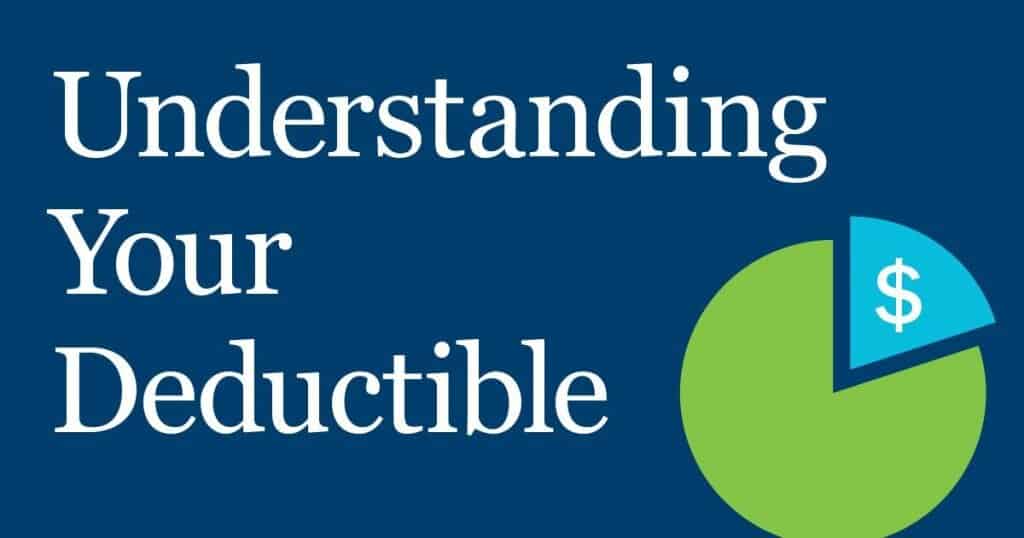The concept of a deductible, or the specific amount that you must pay before the insurance company will pay a claim, can be confusing. For instance, if you’re involved in an accident, and you have a $1000 of property damage to the car, you would be responsible for that entire amount if you have no deductible. And these days, you can accumulate a $1000 dollars’ worth of repairs rather quickly which makes for a very uncomfortable financial situation.
On the other hand, if you have a $200 deductible, you would be responsible for $200, and the insurance company would pay the rest and so on. So if you have a $500 deductible, you would be responsible for $500, and the insurance company would be responsible for the rest.
Likewise, if you’re involved in an accident, sometimes it’s beneficial to place the claim through your coverage even though the other driver may have his or her own. Under those particular circumstances, if you’ve already paid your deductible, you’ll get it back. What’s beneficial about taking that alternative is getting the damage to your vehicle fixed in a timely manner.
Sure — here’s a clear legal explanation of a deductible, focusing on its meaning and purpose in law (especially in insurance law):
Meaning of a Deductible
In legal and insurance terms, a deductible is the amount of money that an insured person must pay out of their own pocket before their insurance coverage begins to pay for a claim. It represents the portion of a loss that the insured agrees to bear personally. Deductibles are a common feature in many types of insurance policies—such as automobile, health, property, and liability insurance.
In essence, if an insured suffers a covered loss, they first pay the deductible amount, and the insurer pays the remainder (up to the policy limit).
For example:
If a property insurance policy has a deductible of $1,000 and a fire causes $5,000 in damage, the insured pays the first $1,000, and the insurer covers the remaining $4,000.
Legal Purpose of a Deductible
From a legal and contractual standpoint, the deductible is a term of the insurance contract that allocates risk between the insured and the insurer. It is legally binding once agreed to by both parties. The deductible clause is included in the policy to:
- Prevent small or trivial claims – Insurers use deductibles to discourage the filing of minor claims that would be costly to process relative to the amount paid.
- Encourage care and responsibility – Since the insured shares part of the loss, they are motivated to act prudently and avoid unnecessary risks.
- Reduce insurance premiums – By assuming part of the risk, the insured typically pays a lower premium because the insurer’s potential liability is reduced.
- Promote fairness and efficiency – The deductible helps ensure that insurance operates as a tool for significant and unforeseen losses rather than minor inconveniences.
Types of Deductibles
Deductibles can take different legal and practical forms, depending on the insurance type and jurisdiction:
- Fixed (or Flat) Deductible – A specific, pre-determined dollar amount subtracted from each claim (e.g., $500 per incident).
- Percentage Deductible – A deductible calculated as a percentage of the total insured value or loss (common in homeowners’ and catastrophe insurance, such as hurricane or earthquake coverage).
- Aggregate Deductible – The total amount the insured must pay during a policy period before the insurer starts covering any claims. Once the insured reaches that total, the insurer pays for all subsequent losses.
- Franchise Deductible – A deductible where the insurer pays the entire loss once the loss amount exceeds a certain threshold. If it doesn’t exceed that threshold, the insurer pays nothing.
Legal Enforcement and Interpretation
Deductible clauses are interpreted under general contract law principles. Courts will generally uphold a deductible clause as long as:
- It is clearly stated in the insurance policy,
- The insured had knowledge of it, and
- It does not conflict with any statutory or regulatory requirements.
If the language of the deductible provision is ambiguous, courts often interpret it in favor of the insured (under the contra proferentem rule, which construes unclear terms against the drafter—in this case, the insurer).
In disputes, questions can arise about how the deductible applies—for instance, whether it applies per claim, per occurrence, or per policy period. Courts analyze the wording and intent of the policy to determine the correct interpretation.
Deductible vs. Excess
In some legal systems, particularly in the United Kingdom and Commonwealth countries, the term “excess” is used interchangeably with “deductible.” However, there can be subtle distinctions in practice:
- A deductible often reduces the total amount payable by the insurer.
- An excess may represent the portion of the loss the insured must bear before coverage attaches.
In most cases, both serve the same legal and practical function—sharing risk between insurer and insured.
Legally, a deductible is a vital contractual mechanism in insurance law that balances risk and responsibility between the insured and the insurer. It ensures that insurance serves its proper purpose: protecting against significant, unexpected losses rather than minor or frequent damages. By requiring the insured to bear a small part of the loss, deductibles promote fairness, reduce moral hazard, and contribute to the overall stability of the insurance system.
Sometimes insurance companies might put off paying a claim under the guise of conducting an investigation, and in the meantime, you’re waiting for their decision without a car to drive. Basically, your specific circumstances would determine what option I would recommend to you. Contact our team to learn more.

Recent Comments